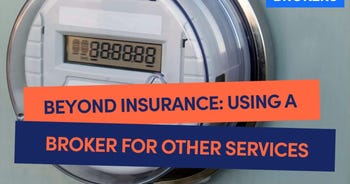Everything your SME needs to know about ghost brokers & how they work
If you’re a small business owner, you’re probably already juggling a million tasks, and the last thing you need is to fall victim to an insurance scam.
Ghost broking is a form of insurance fraud that can be lethal to your business, but did you know that only 1 in 10 adults have heard of the term.
If you haven’t heard of it either, don't worry. We’ll break down everything there is to know about ghost brokers, how the scams work and some of the most common ones you should be looking out for.

What is ghost broking?
Ghost broking is a sneaky type of insurance fraud where scammers sell you fake or invalid insurance policies.
These fraudsters often pose as legitimate insurance brokers, tricking business owners into buying non-existent or counterfeit insurance. This can leave business owners high and dry without proper cover and at risk of significant financial loss if the worst should happen. Imagine thinking you’re covered, only to find out your policy is a sham when you need it most. That’s not a situation any business owner wants to be in.
How does ghost broking work?
Ghost brokers can seem like experts at exploiting gaps in the insurance industry verification process, but here’s a closer look at how these scams usually play out:
- Attractive offers — Ghost brokers generally know how to catch your eye with unbelievably low premiums or deals that seem too good to be true. They might advertise these offers online, in scam emails or even over the phone, making it look and sound like you’re getting a great bargain.
- Fake documentation — Once they’ve attracted your attention, ghost brokers provide fake insurance documents that look incredibly convincing. These documents might include fake policy numbers, official-looking logos, and all the legal language you’d expect to find in a genuine policy.
- Payment and disappearance — After you’ve parted with your hard-earned money, the ghost broker simply disappears without a trace. You’re left with a worthless policy, and when you try to make a claim, you’ll find out that the insurance company has no record of your policy. By then, the ghost broker is long gone, and you’re left to pick up the pieces.
Who can be the victims of ghost brokers?
Anyone can fall victim to ghost brokers, but SMEs are perfect targets for these scammers. Why? Because small to medium businesses might not always have the time or resources to thoroughly check every insurance offer that comes their way.
If you’re running a small business, you’re probably wearing a dozen hats already and looking for ways to cut costs. Those attractive, low-cost insurance deals can be tempting, but that’s what ghost brokers count on.
What insurance industries are targeted the most by ghost brokers?
Ghost broking isn’t limited to just one type of insurance — these scammers cast a wide net. However, there are two industries they seem to target more than others:
- Motor insurance — This is generally the most common type of ghost broking insurance sector that fraudsters target. Essentially, if you’ve got a business with a fleet of vehicles, you’re going to need motor insurance. Ghost brokers know this and will offer dirt-cheap premiums that sound too good to pass up.
- Property insurance — Protecting your business premises is a no-brainer. Scammers will exploit this necessity by offering fake property insurance policies that look perfectly legit.
Always be cautious and do your due diligence to avoid falling into their trap.
What are some common ghost-broking scams?
Ghost brokers are a smart bunch, and they’ll use a variety of tactics to trick unknowing business owners into buying fake insurance. Here are some of the most common scams you need to watch out for:
- Fake insurance communication - scammers will use any method of communication they can, including emails, letters, text messages and social media posts that look like they’re from legitimate and well known insurance companies or brokers, similar to Bionic. These communications often offer you policies or ask for details to update your current policy. They’re designed to look official and can easily fool you into thinking you’re dealing with a genuine insurer.
- Fake insurance adverts - you might come across advertisements on social media, search engines or websites promoting deals that seem too good to be true — spoiler alert, they usually are! These ads often promise huge savings on insurance premiums, but always be wary of these adverts as they can lead you straight into the hands of ghost brokers.
- Fake insurance quotes - ghost brokers often provide fake quotes that are significantly lower than genuine market rates. They might present these quotes with convincing documentation and professional presentations. Sadly, it’s all part of their ploy to make you believe you’re getting a fantastic deal.
- Fake no-claims bonus - some ghost brokers will entice small business owners with policies that include a fake no-claims bonus. They manipulate your information to make it appear as though you have a no-claim history, which reduces the quoted premium. This can make their offer seem more attractive, but it’s all smoke and mirrors.
How can you protect your business against insurance scams?
Protecting yourself against ghost brokers involves being vigilant and doing your homework. But there are two main steps you can take to safeguard your business:
Buy from a reputable insurance website
Always purchase insurance from reputable, well-known insurance companies or brokers, like Bionic. We work with a trusted panel of insurers to bring you competitive deals so you know your business is in safe hands when it comes to getting the right insurance.
It’s always best to do your research, check reviews and ratings, and make sure the company has a great track record. Remember, don’t be swayed by deals that seem too good to be true as they usually are.
Check the Financial Services Register
Before committing to any insurance purchase, check the Financial Services Register to verify that the broker or company is authorised by the Financial Conduct Authority (FCA).
This is an important step to ensure that you’re dealing with a legitimate broker and insurer. The register is a handy tool that lets you confirm the credentials of any insurance provider or broker that you’re considering using.
Remember, a little extra effort in verifying your insurance can save you a lot of trouble down the line.
What should you do if your business is the victim of ghost broking?
If you suspect you’ve fallen victim to ghost broking, don’t panic, but do act quickly to minimise the damage.
- Contact the police - first things first, report the fraud to the police immediately. This isn’t just a small hiccup; it’s a serious crime. The police can investigate and potentially track down the scammers. The more information you can provide, the better, so try to have all the details ready when you make the report.
- Gather any evidence - Collect all communications, documents and receipts related to the scam. This evidence is crucial for investigations and any legal actions that might follow. Save everything — emails, text messages, screenshots of websites, payment receipts, and any other correspondence you had with the fraudster. The more detailed your records, the easier it will be for the authorities to investigate.
- Get in touch with the insurance company - Next, inform the legitimate insurance company about the fraud. Even if the fake policy seemed genuine, it’s essential the real insurer knows what’s happened — especially if you already have another form of insurance with them. The insurer can guide you on the next steps, and in some cases, they might be able to offer you temporary coverage or other assistance while things are being sorted out. They’ll also want to make sure that all your other policies are secure and haven’t been tampered with.
- Check your credit report - Review your credit report for any unusual activity. Ghost broking scams can sometimes lead to identity theft, which can impact your credit score. It’s a good idea to request a detailed credit report from all major credit bureaus — look for any new accounts or credit inquiries that you don’t recognise and report any suspicious activity immediately.
- Seek legal advice - Consult with a legal professional to understand your rights and options. Dealing with the aftermath of fraud can be complex, and having a solicitor on your side can make a big difference. They can help you navigate the legal implications of the fraud, guide you on how to protect yourself moving forward and assist with any claims you might need to make. They can also advise on whether you have any recourse to recover your lost money.
Stay insurance savvy with Bionic
Ghost broking is a serious threat, but with the right knowledge and precautions, you can protect your business from these schemes. Remember, your business's security and financial health should be protected.
If you’re looking for business insurance, start a quote online to find the best policy to suit your business — whether you’re looking for caterers insurance, plumbers insurance or anything in-between.
Or, find out everything there is to know about insuring your business with our insurance guides.








